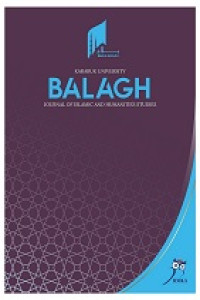Öz
Abstract
Muslim jurists divided migration into two categories: migration by choice and migration by necessity, and each category is divided into several subcategories as well. Migration has been divided into commendable and deplorable, as it has benefits and harms as well. Muslim jurists did not look at migration from the perspective of this world only, as is the case with most contemporary researchers; rather, they consider the afterlife too. By reading the prophetic hadiths and traces related to the issue of migration, the researcher found that several benefits of migration were mentioned, both for this world and the afterworld, whether the migration is for the sake of good or fleeing from evil. The example of the first category is to migrate to seek halal livelihood, to learn helpful science, to adjacent the sacred sites, to perform Jihad for Allah's sake, or to seek recovery from diseases. The narrators of Hadith had an intensified interest in traveling to hear and learn the Hadiths from the time of the companions and their followers till the time being. The example of the second category is migration from a country where a Muslim is subjected to sedition in his religion and where evils are common, as well as migration from countries where Muslims are humiliated or where the Muslim is exposed to harm and fear for themselves and their family. The researcher intends to extrapolate the benefits of migration from what has been stated in the Hadiths, the rewards that Allah promised for it, as well as the worldly benefits, indicating the criterion used to distinguish between migration by choice and migration by necessity. The discussion will rely mainly on the Hadiths related to this issue.
Anahtar Kelimeler
Kaynakça
- ابن أبي شيبة، عبدالله بن محمد. المصنف في الأحاديث والآثار. تقديم وضبط: كمال يوسف الحوت، لبنان، دار التاج، الرياض، مكتبة الرشد، الطبعة الأولى، ١٤٠٩ هـ - ١٩٨٩ م.
- ابن الجوزي، عبد الرحمن بن علي. كشف المشكل من حديث الصحيحين. تحقيق: علي حسين البواب، الرياض، دار الوطن، د.ت.
- ابن القطان، علي بن محمد. بيان الوهم والإيهام في كتاب الأحكام. تحقيق: د. الحسين آيت سعيد، الرياض، دار طيبة، الطبعة الأولى، ١٤١٨هـ-١٩٩٧م.
- ابن الملقن، عمر بن علي. التوضيح لشرح الجامع الصحيح. تحقيق: دار الفلاح للبحث العلمي وتحقيق التراث بإشراف خالد الرباط، جمعة فتحي، دمشق، دار النوادر، الطبعة الأولى، ١٤٢٩ هـ - ٢٠٠٨ م.
- ابن حجر، أحمد بن علي. تهذيب التهذيب. الهند، مطبعة دائرة المعارف النظامية، الطبعة الأولى، ١٣٢٦هـ.
Öz
الملخص:
قسّم العلماء الهجرة إلى قسمين: هرباً وطلباً، ويندرج تحت كل قسمٍ منها أقسام، وللهجرة كما هو معلوم فوائد ومضار. ومن هنا انقسمت إلى هجرة محمودة وهجرة مذمومة. ولم يقتصر علماء الإسلام على النظر إلى الهجرة بمنظار الدنيا فقط كما هي الحال عند معظم الباحثين المعاصرين، بل نظروا إليها بمنظار الدين والنفع الأخروي أيضاً. وقد تبين للباحث من خلال مطالعة الأحاديث النبوية والآثار الواردة في الباب أنها أشارت إلى كثير من فوائد الهجرة، سواء منها الدنيوية أو الأخروية. وسواء كانت الهجرة ابتغاء لِخير وأمر مطلوب أو فراراً من شر. فمن القسم الأول الهجرة لطلب الرزق الحلال، أو لتعلم علم من العلوم النافعة، أو للمجاورة بالحرمين وغيرهما من الأماكن المقدسة، أو للجهاد في سبيل الله، ونصرة المظلومين، أو طلباً للعلاج والشفاء من الأمراض. وقد اشتدت عناية المحدثين بالرحلة في طلب الحديث منذ عهد الصحابة والتابعين إلى يومنا هذا... ومن القسم الثاني الهجرة من البلاد التي يتعرض فيها المسلم للفتنة في دينه، والبلاد التي تشيع فيها المنكرات، وكذلك الهجرة من بلاد الكفار إلى بلاد المسلمين، ومن البلاد التي يكون فيها المسلم ذليلاً أو التي تظهر فيها البدع، أو التي يتعرض فيها المسلم لأذى ويخاف على نفسه وأهله... والباحث يعتزم استقراء الفوائد المترتبة على الهجرة مما ذكرته الأحاديث الشريفة وبيان الأجر المترتب عليها، وكذلك الفوائد الدنيوية. مع بيان المعيار المتبع في التمييز بين الهجرة المطلوبة وجوباً أو ندباً والهجرة المذمومة تحريماً أو كراهةً. وكل ذلك بالاسترشاد بالأحاديث والآثار الواردة في الباب.
Anahtar Kelimeler
Kaynakça
- ابن أبي شيبة، عبدالله بن محمد. المصنف في الأحاديث والآثار. تقديم وضبط: كمال يوسف الحوت، لبنان، دار التاج، الرياض، مكتبة الرشد، الطبعة الأولى، ١٤٠٩ هـ - ١٩٨٩ م.
- ابن الجوزي، عبد الرحمن بن علي. كشف المشكل من حديث الصحيحين. تحقيق: علي حسين البواب، الرياض، دار الوطن، د.ت.
- ابن القطان، علي بن محمد. بيان الوهم والإيهام في كتاب الأحكام. تحقيق: د. الحسين آيت سعيد، الرياض، دار طيبة، الطبعة الأولى، ١٤١٨هـ-١٩٩٧م.
- ابن الملقن، عمر بن علي. التوضيح لشرح الجامع الصحيح. تحقيق: دار الفلاح للبحث العلمي وتحقيق التراث بإشراف خالد الرباط، جمعة فتحي، دمشق، دار النوادر، الطبعة الأولى، ١٤٢٩ هـ - ٢٠٠٨ م.
- ابن حجر، أحمد بن علي. تهذيب التهذيب. الهند، مطبعة دائرة المعارف النظامية، الطبعة الأولى، ١٣٢٦هـ.
Öz
Kaynakça
- ابن أبي شيبة، عبدالله بن محمد. المصنف في الأحاديث والآثار. تقديم وضبط: كمال يوسف الحوت، لبنان، دار التاج، الرياض، مكتبة الرشد، الطبعة الأولى، ١٤٠٩ هـ - ١٩٨٩ م.
- ابن الجوزي، عبد الرحمن بن علي. كشف المشكل من حديث الصحيحين. تحقيق: علي حسين البواب، الرياض، دار الوطن، د.ت.
- ابن القطان، علي بن محمد. بيان الوهم والإيهام في كتاب الأحكام. تحقيق: د. الحسين آيت سعيد، الرياض، دار طيبة، الطبعة الأولى، ١٤١٨هـ-١٩٩٧م.
- ابن الملقن، عمر بن علي. التوضيح لشرح الجامع الصحيح. تحقيق: دار الفلاح للبحث العلمي وتحقيق التراث بإشراف خالد الرباط، جمعة فتحي، دمشق، دار النوادر، الطبعة الأولى، ١٤٢٩ هـ - ٢٠٠٨ م.
- ابن حجر، أحمد بن علي. تهذيب التهذيب. الهند، مطبعة دائرة المعارف النظامية، الطبعة الأولى، ١٣٢٦هـ.
Ayrıntılar
| Birincil Dil | Arapça |
|---|---|
| Konular | Din Araştırmaları |
| Bölüm | Research Articles |
| Yazarlar | |
| Yayımlanma Tarihi | 15 Haziran 2023 |
| Gönderilme Tarihi | 27 Nisan 2023 |
| Yayımlandığı Sayı | Yıl 2023 Cilt: 3 Sayı: 1 |

